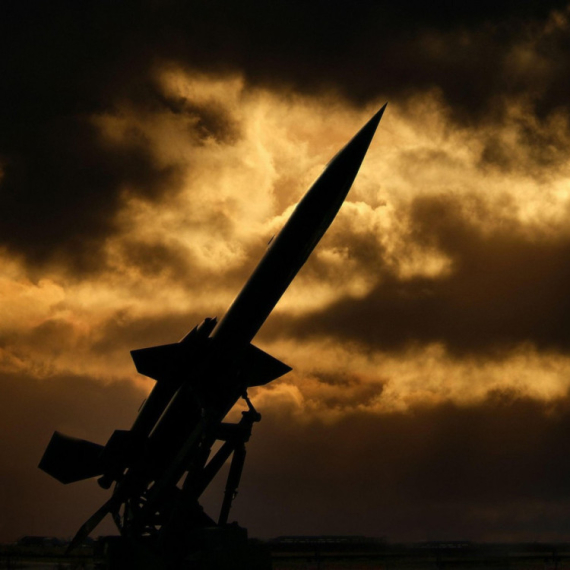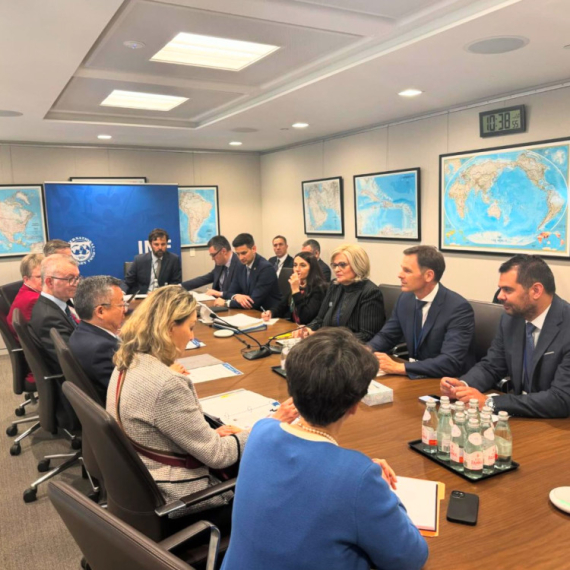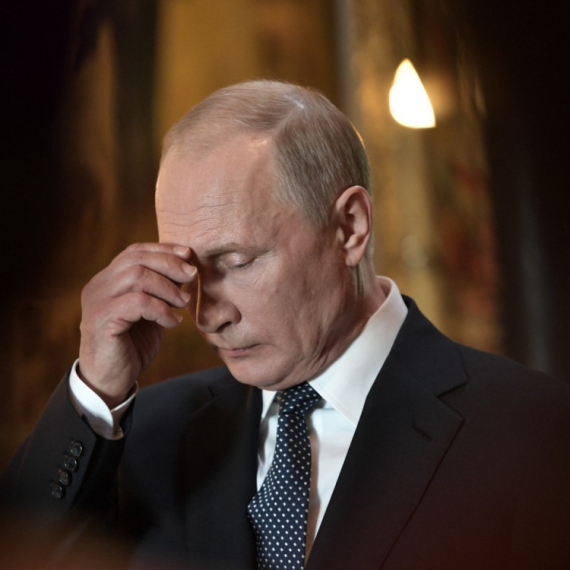Vienna: Cautious optimism from Belgrade team
The third round of direct negotiations on Kosovo's future status concluded in Vienna this afternoon.
Monday, 22.10.2007.
09:16

The third round of direct negotiations on Kosovo's future status concluded in Vienna this afternoon. Belgrade and Pristina, represented by teams led by Foreign Minister Vuk Jeremic, Minister for Kosovo Slobodan Samardzic, and the province's interim prime minister and president, Agim Ceku and Fatmir Sejdiu, faced eachother, under the mediation of the Contact Group Troika. Vienna: Cautious optimism from Belgrade team Samardzic and Jeremic said afterwards that the talks were difficult, with a danger of moving the process away from its basic issue, that of status, toward that of relations between Belgrade and Pristina. The Serbian government team made it clear that the process must be conducted within the framework of UN Resolution 1244, and that it must focus on status, while any talks on the future relations between Serbia and its southern province can be a part of the status solution, Samardzic said. Status is the main issue and insisting on the 1244 is crucial, he said, emphasizing that the mediating Troika has "redefined its stand on the resolution." Kosovo Albanians said they rejected the "intellectual discussion" on whether the resolution is acceptable, "while the Serbian team demanded recognition of the fact that this document is recognized by the whole world," Samardzic said. The 14-point Troika document was not discussed today as announced earlier, as the entire afternoon session focused on status, he said. The Troika document will be the central topic as negotiators meet next time, while the Belgrade team has presented to the Troika its response to the document, Samardzic added. "This was a difficult day. The talks were hard but meaningful and the process can be expected to continue. It seemed for a while that continuation could hardly be expected, but after the afternoon session, it turned out that the process can continue and a new round has already been scheduled for November 5," Jeremic said after the meetings. He added that the state delegation cited a document presented by the Pristina team, which says a unilateral solution cannot lead to peace and stability, and agreed with this view. "This is definitely one of the points on which both delegations agree," he said. Jeremic said he "did not wish to sound too optimistic," but that the process is "moving towards a compromise solution." Slobodan Samardzic in Vienna today (Tanjug) Troika: Next round on November 5 The Contact Group's Troika, made up of EU, U.S. and Russian diplomats, Wolfgang Ishinger, Frank Wisner and Aleksandr Botsan-Kharchenko, said in a statement released in Brussels that the third round of direct negotiations between Belgrade and Pristina in Vienna on Monday presented discussion points "which might pave the way to a negotiated solution," and announced that the next round of negotiations would be once again held in Vienna, on November 5. "In line with its intention to seek a solution in an energetic and pro-active way, the Troika presented discussion points to the sides with the aim of finding room for agreement which might pave the way to a negotiated solution," the statement, issued by the EU, said. "The Troika listened and carefully noted the sides' responses to each of the points [...] This exchange represents a part of the debate which the Troika has with the sides," the statement said. The diplomats first met with each side individually and then enabled direct several hour long eye-to-eye negotiations between the sides, continuing a debate about the final status and possible room for agreement. The mediators added that both sides "pledged they would continue to refrain from any provocative acts or statements that might jeopardize the security and stability of the region or the ongoing process." Today, the delegations were to discuss the 14-article document prepared by the diplomats, which contains the statement that Belgrade's physical presence in Kosovo is no longer possible. However, no proposals for the future status of Kosovo or independence are mentioned. Instead of a status proposal, the Troika document that will be discussed during the next round, states the areas where cooperation between Belgrade and Pristina could be improved, including the energy industry, social welfare, minority and cultural heritage protection, fight against organized crime, and solving the problem of refugees and missing persons. According to the document, Belgrade and Pristina should focus on the development of special joint relations, solving problems peacefully in the future, and not engaging in actions that could be seen as threatening by the other side. It was added that Kosovo will be completely involved with regional structures, especially those referring to economic cooperation, and Belgrade "will not interfere in Pristina's relations with international financial organizations." It was also stated that "there will be no repeating of the 1999 situation," and that "Belgrade will not rule over Kosovo." "Belgrade and Pristina decided to work on progress which is to lead towards association and potential membership in the EU, as well as a progressive incorporation into Euroatlantic structures," it was stated in the document. Pristina will be independent in managing its finances, and Kosovo will continue the process of stabilization and association with the EU without Belgrade's interference. "The international community will keep its civilian and military presence in Kosovo, after the status determination," stressed the Troika. Frank Wisner (FoNet) Pristina: Serbia offers past Although official Belgrade negotiators sounded an optimistic note that the process might be moving toward a compromise, their Pristina counterparts expressed no such hope as they addressed reporters in the Austrian capital. The province's prime minister, Agim Ceku, said in reaction to today's negotiations, that the two delegations were "far apart," because what Belgrade proposed "refers to the past and the negotiating process to the future." "We are far apart, this process refers to the future of Kosovo, region and Serbia. What Serbia proposes refers to the past. They offer the previous status of Kosovo. We have two different concepts - one for the future, one for the past," Ceku said. He added there was "still time" for Serbia to accept the Ahtisaari plan as the "best possible solution". Ceku also added that "Serbia has a history of refusing agreements." He invited Belgrade to "look into the future" and "learn from history." Ceku reiterated Pristina's stand that independence of Serbia's southern province was "agreed on and supported by the majority of the international community" and that one should "no longer wasting time on the things on which no agreement could be made." Agim Ceku (FoNe)
Vienna: Cautious optimism from Belgrade team
Samardžić and Jeremić said afterwards that the talks were difficult, with a danger of moving the process away from its basic issue, that of status, toward that of relations between Belgrade and Priština.The Serbian government team made it clear that the process must be conducted within the framework of UN Resolution 1244, and that it must focus on status, while any talks on the future relations between Serbia and its southern province can be a part of the status solution, Samardžić said.
Status is the main issue and insisting on the 1244 is crucial, he said, emphasizing that the mediating Troika has "redefined its stand on the resolution."
Kosovo Albanians said they rejected the "intellectual discussion" on whether the resolution is acceptable, "while the Serbian team demanded recognition of the fact that this document is recognized by the whole world," Samardžić said.
The 14-point Troika document was not discussed today as announced earlier, as the entire afternoon session focused on status, he said.
The Troika document will be the central topic as negotiators meet next time, while the Belgrade team has presented to the Troika its response to the document, Samardžić added.
"This was a difficult day. The talks were hard but meaningful and the process can be expected to continue. It seemed for a while that continuation could hardly be expected, but after the afternoon session, it turned out that the process can continue and a new round has already been scheduled for November 5," Jeremić said after the meetings.
He added that the state delegation cited a document presented by the Priština team, which says a unilateral solution cannot lead to peace and stability, and agreed with this view.
"This is definitely one of the points on which both delegations agree," he said.
Jeremić said he "did not wish to sound too optimistic," but that the process is "moving towards a compromise solution."
Troika: Next round on November 5

"In line with its intention to seek a solution in an energetic and pro-active way, the Troika presented discussion points to the sides with the aim of finding room for agreement which might pave the way to a negotiated solution," the statement, issued by the EU, said.
"The Troika listened and carefully noted the sides' responses to each of the points [...] This exchange represents a part of the debate which the Troika has with the sides," the statement said.
The diplomats first met with each side individually and then enabled direct several hour long eye-to-eye negotiations between the sides, continuing a debate about the final status and possible room for agreement.
The mediators added that both sides "pledged they would continue to refrain from any provocative acts or statements that might jeopardize the security and stability of the region or the ongoing process."
Today, the delegations were to discuss the 14-article document prepared by the diplomats, which contains the statement that Belgrade's physical presence in Kosovo is no longer possible.
However, no proposals for the future status of Kosovo or independence are mentioned.
Instead of a status proposal, the Troika document that will be discussed during the next round, states the areas where cooperation between Belgrade and Priština could be improved, including the energy industry, social welfare, minority and cultural heritage protection, fight against organized crime, and solving the problem of refugees and missing persons.
According to the document, Belgrade and Priština should focus on the development of special joint relations, solving problems peacefully in the future, and not engaging in actions that could be seen as threatening by the other side.
It was added that Kosovo will be completely involved with regional structures, especially those referring to economic cooperation, and Belgrade "will not interfere in Priština's relations with international financial organizations."
It was also stated that "there will be no repeating of the 1999 situation," and that "Belgrade will not rule over Kosovo."
"Belgrade and Priština decided to work on progress which is to lead towards association and potential membership in the EU, as well as a progressive incorporation into Euroatlantic structures," it was stated in the document.
Priština will be independent in managing its finances, and Kosovo will continue the process of stabilization and association with the EU without Belgrade's interference.
"The international community will keep its civilian and military presence in Kosovo, after the status determination," stressed the Troika.
Priština: Serbia offers past

The province's prime minister, Agim Ceku, said in reaction to today's negotiations, that the two delegations were "far apart," because what Belgrade proposed "refers to the past and the negotiating process to the future."
"We are far apart, this process refers to the future of Kosovo, region and Serbia. What Serbia proposes refers to the past. They offer the previous status of Kosovo. We have two different concepts - one for the future, one for the past," Ceku said.
He added there was "still time" for Serbia to accept the Ahtisaari plan as the "best possible solution".
Ceku also added that "Serbia has a history of refusing agreements."
He invited Belgrade to "look into the future" and "learn from history."
Ceku reiterated Priština's stand that independence of Serbia's southern province was "agreed on and supported by the majority of the international community" and that one should "no longer wasting time on the things on which no agreement could be made."



























































Komentari 50
Pogledaj komentare